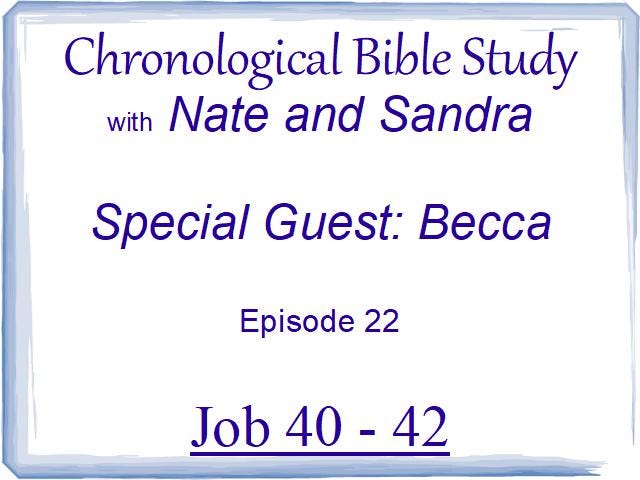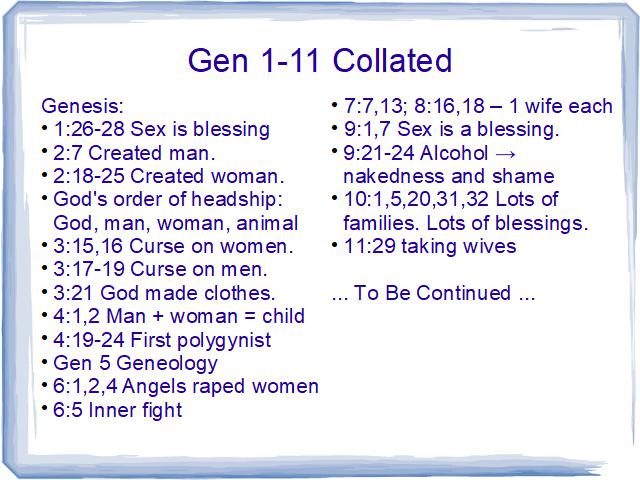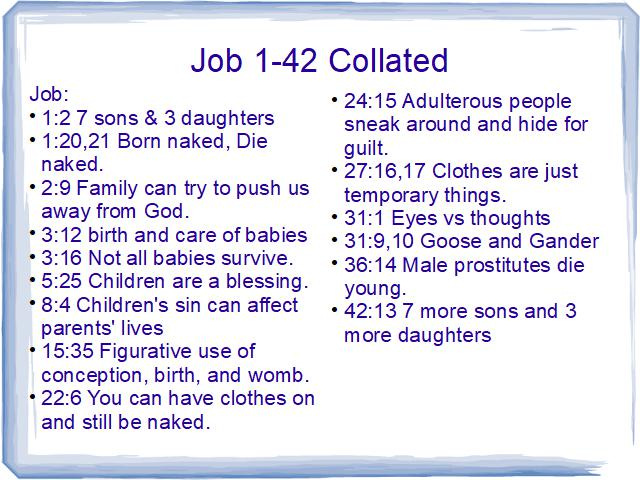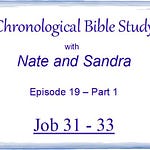Welcome to the Chronological Bible Study Podcast
with Nate and Sandra.
This is episode 22, the technical study of Job 40-42.
The Bible study process I'm using is straightforward:
First, I expect you to read the chapters we'll be going over and making your own notes and analysis.
In just a moment, I'll summarize the reading, one chapter at a time.
Next, I'll highlight some important verses in each chapter, esp those that apply to our chosen topic of Sex and Marriage.
I'll then compare the reading in different translations which will help bring out translational challenges and bring important words to our attention.
We'll get into a bit of a word study using Strong's and other references to dive deeper into the words used and what they mean.
As needed, I have genealogy charts and maps to help make this a little easier.
Lastly, I'll come to some conclusions on each chapter and collate these conclusions with our prior studies to bring the verses on our topic into focus.
As always, your feedback is appreciated.
Job 40 Summary
God (Part 3)
vs1,2 God to Job
vs 2 "Faultfinder" vs "contend" vs "cavilleth"; "reprove" vs "argue" vs "correct"
"cavil" means "to raise trivial or frivolous objections".
In modern parlance, we'd say this person is simply "argumentative".
vs3-5 Job
Like his friends, Job knows when to shut up and is considered wise for it.
vs 6-14 Impress Me
vs 7 "Dress for action like a man". We examined this last week.
vs 8 " Will you even put me in the wrong? Will you condemn me that you may be in the right?"
vs 9 "arm like God" / "thunder with a voice like Him"
Odd since it's in 3rd person when God is talking about Himself.
vs 10 "Deck thyself" shortened version of "bedeck" which is from the same root as "decorate". Similar in function as "array" or "clothe" which is the word we looked at before that means "to wrap around".
vs 11,12 "Look on everyone who is proud and bring him low" TWICE!
1) God is powerful enough to humble the proud with a look.
2) Job and his friends were so proud that they were blind to the pride in both themselves and others. Job can't rebuke the sin he can't see.
vs 14 "And I will admit that you can save yourself by your own power." Job can't do any of this and can't do that either. Humility recognized our own limitations. Pride pretends that we have none.
vs 15-24 Behemoth
vs 15 "Behemoth" is transliterated from the Hebrew. The Bible dictionary I'm using is trying to say that it's a "hippopotamus", but the description is obviously not that.
vs 15: Eats grass like an ox.
vs 16 Strength in his loins; force in the navel of his belly.
vs 17: Tail like a cedar; sinews of his stones are wrapped together.
Tail like cedar? Obvious. This looks like a diplodocus or other aquatic dinosaur.
"Sinews" usually is thought of as tendons.
"Stones" are only used here. It's not the normal word for rocks. It seems to be a euphemism for the creature's testicles. In life & death, jungle warfare, such a sensitive part of his anatomy would be a prime target to bring him down. His most sensitive parts are protected.
Most translations try to call it "thighs", but there is another, different word for thighs of both man and beast.
vs 18 Bones like brass or bars of iron
vs 19 Chief of the ways of God; only God can defeat him.
vs 20 Mountains bring him food; plays with the beasts of the field.
vs 21,22 Rests under shady trees, hidden in the reeds and swamp.
vs 23 KJV: Makes it seem like he can drink the river. Later translations seem to refer to his confidence in crossing the river regardless of depth or current.
vs 24 You can't catch him. He's always watching and smarter than your traps.
Highlights
vs 8 " Will you even put me in the wrong? Will you condemn me that you may be in the right?"
vs 14 "If you can do any of these things, then even I will praise you. And I will admit that you can save yourself by your own power."
Job 40 Alternate Translations & Word Studies
v2 “ Shall he that contendeth with the Almighty instruct him? he that reproveth God, let him answer it.”
OR “Shall he that cavilleth contend with the Almighty? He that argueth with God, let him answer it.”
OR “Shall a faultfinder contend with the Almighty? He who argues with God, let him answer it.”
OR "Shall a reprover contend with the Almighty? He who reproves God, let him answer it."
"contendeth" - H7378 - A primitive root; properly to toss, that is, grapple; mostly figuratively to wrangle, that is, hold a controversy; (by implication) to defend
"instruct" - H3250 - From H3256; a reprover
H3256 - A primitive root; to chastise, literally (with blows) or figuratively (with words); hence to instruct
"reproveth" - H3198 - A primitive root; to be right (that is, correct); reciprocally to argue; causatively to decide, justify or convict
vs 9 "Or hast thou an arm like God? And canst thou thunder with a voice like him?"
OR "Are your arms as strong as mine? Do you have a voice like mine that is as loud as thunder?"
The first word is "strength" often translated as God.
The 2nd word is a comparative.
So some translations try to keep both in 3rd person, but some try to keep them both in 1st person.
vs 17b "the sinews of his stones are wrapped together."
OR "the sinews of his thighs are knit together."
"sinews" - H1517 - Probably from H1464; a thong (as compressing); by analogy a tendon
"stones" - H6344 - The same as H6343; a testicle (as a cause of shame akin to fear)
vs 23 "Behold, he drinketh up a river, and hasteth not: he trusteth that he can draw up Jordan into his mouth."
OR "Though the river rages, Behemoth is unafraid; he remains secure, though the Jordan surges to his mouth."
"drinketh up" - H6231 - A primitive root (compare H6229); to press upon, that is, oppress, defraud, violate, overflow
"hasteth" - H2648 - A primitive root; properly to start up suddenly, that is, (by implication) to hasten away, to fear
"draw up" - H1518 - A primitive root; to gush forth (as water), generally to issue
Job 40 Conclusions
God is doubling down on humiliation. Job's pride brought him up. God is increasing the level of power in the natural world. Job can't contend with beasts, but he presumes to contend with God.
Job argued that God was wrong in his pride to make himself be right. He wasn't thinking, only reacting emotionally.
The ultimate cause for humility is recognizing that we CANNOT save ourselves and MUST have God's mercy to save us in the end.
The Behemoth sounds like many different dinosaurs. Below are some that might be what God is talking about as well as an AI generated rendering unlike any dinosaur I've ever seen.
Job 41 Summary
God (Part 4)
Vs 1-34 Leviathan
Leviathan is also a transliteration. From H3867; a wreathed animal, that is, a serpent (especially the crocodile or some other large sea monster); figuratively the constellation of the dragon; also as a symbol of Babylon
vs 1,2 Can you control Leviathan like a horse or fish?
vs 3,4 Will he submit and serve?
vs 5 Is he a pet or toy?
vs 6,7 Will he be sold in the market?
vs 8-10 See, experience, and be afraid.
vs 11 Who has given to Me first that I should repay him?
vs 12 limbs, strength, graceful shape
vs 13 Who can skin him or ride him like a horse?
vs 14 Lips = door of his face; teeth = terror
vs 15-17 Back = rows of shield, shut up close against air.
vs 18 Sneezes flash light; eyes like eyelids of the dawn
vs 19-21 Fire-breathing
vs 22 Neck abides strength
vs 23 Flesh sticks together.
vs 24 Heart is hard
vs 25 Soldiers are afraid of him, but not he of them.
vs 26-29 No weapon can penetrate him.
vs 30 Underparts like sharp potsherds.
vs 31,32 Swims in the deep water
vs 33,34 Creature without fear; king of pride.
Highlights
v11a “Who has first given to me, that I should repay him?”
God made it all. He gave it to us first. Everything is His, even us.
He doesn't owe anyone, anything.
Job 41 Alternate Translations & Word Studies
No significant translational differences or words to examine.
Job 41 Conclusions
Leviathan is the icing on the cake of animal creation. It's the ultimate alpha predator: a fire-breathing dragon.
The description reminds me a LOT of Smaug from The Hobbit by JRR Tolkein or Draco from Dragonheart. The major difference between this description and the popular dragon is the noticable lack of wings or flight. At no time in Job 41 does the Leviathan fly or have wings. It's a land-bound dinosaur than can breathe fire.
I've been playing Skyrim. The description of Leviathan here makes the cult of Dragon worshippers a lot more realistic than we might think in the modern godless age. In order to make it a game, the dragons have to be defeatable, but this description makes this a rare or impossible prospect for a weapons swung by hand. The Dragonborn must be god-like in order to defeat a dragon.
Job 42 Summary
Conclusion
Vs 1 Job to God
vs 2,3 You're right; I spoke in ignorance.
vs 4 You said.
vs 5 I know better now.
vs 6 I'm ashamed and repent.
vs 7,8 God to Friends
vs 9 Friends repented. Job prayed.
7 bulls, 7 rams for the sacrifice. Job is the priest for his friends.
vs 10 Job is restored to wealth.
vs 11 Job restored to relatives.
vs 12 Twice the wealth of Chapter 1.
vs 13 10 more kids
vs 14 Names of the daughters
ALL are transliterated / Anglicized from the Hebrew.
Jemimah - warm, affectionate, a dove: pronounced "yem-ee-maw".
Kezia / Ketsiah - from the peeled bark of the cassia tree, a source of fragrant perfume
Karen-happuch - Karen = horn; hapuk = paint / dye for the eyes aka "horn of cosmetics"
Think "cornucopia" = "horn of plenty"
vs 15 Beauty and treatment of the daughters
vs 16 Job lived another 140 years.
vs 17 Job died.
Elihu is NEVER mentioned in this chapter for good or ill.
Highlights
vs 3b "So I declared, but did not understand things too wonderful for me; yea, I did not know."
v5 “In the past I heard about you, but now I have seen you with my own eyes.”
Job 42 Alternate Translations & Word Studies
No significant translational differences or words to examine.
Job 42 Conclusions
Job repents and admits his fault.
Job's friends are rebuked and repent.
Job is restored to health, wealth and relationships.
Many claim that this book is evidence against "prosperity gospel", but Job, humbled, gets twice as much stuff as before and is blessed with long life, and lots of kids / grandkids.
He started rich. and was humbled (which is likely what they are focusing on), but, in the end, he's restored to even more wealth. By the opponent of "prosperity gospel", Job should've stayed just over broke for the rest of his life as a continual humiliation and NEVER have returned to wealth, let alone be gifted silver coins and golden rings.
Added Job 42:13 showing that Job had 10 more children after all this. The question needs to be considered: did his wife bear 10 more children or did he take a concubine to have them?
Next week, we'll go back to Genesis and continue the story of Abraham.
Genesis 12-14
12: Call of Abram; Go to Egypt
13: Abram and Lot Separate
14: Abram Rescues Lot
Enjoy!


















Share this post